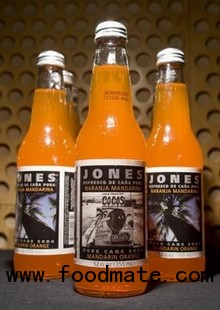
The long-struggling Seattle-based soda-pop marketer said it will not request an appeal of that decision, as it has in the past.
The stock dropped a penny Monday to 40 cents a share. It has traded between 26 and 89 cents during the past year; the last time it traded above $1 a share was in summer 2011.
Delisting likely will mean less trading and, therefore, less liquidity for Jones' stock, which will be traded on the over-the-counter OTCQB Marketplace under its current symbol, JSDA.
Delisting is just the latest blow in a years-long decline for a company that was once a darling of skateboarders and stockholders.
Jones shares peaked at more than $30 each in 2007, the same year it overthrew Coca-Cola as the Seahawks' longtime soft-drink sponsor.
That's also the year its long slide began.
The first warning was a 98 percent drop in its second-quarter profit. It ended the year with a loss and has not turned an annual profit since.
Founder Peter van Stolk stepped down as CEO on Dec. 31 that year, but the bleeding continued.
Revenues have fallen from $39.8 million in 2007 to $17.4 million in 2011.
The Seahawks dropped the sponsorship, as did Alaska Airlines. In 2009, Jones issued its first "going concern" statement. A vestige of the dot-com bust, "going concern" statements appear in securities filings when companies are not sure they are going to make it.
Jones had $7.1 million in cash when it issued its first "going concern" statement. This past June, it had $2.5 million.
It is unclear why five CEOs in five years have been unable to return Jones to its former glory.
The initial injury was self-inflicted but seemingly not mortal: Jones grew too fast and acted on ambitions that outweighed its expertise.
The football and airline contracts meant to expand Jones' image beyond skateboarding and turkey-flavored soda lovers drained much-needed resources.
A bigger problem was Jones' push in the mid-'90s into selling canned soft drinks in national grocery chains.
The company did not have the experience or resources to ensure the cans actually made it to shelves or were presented well inside stores, which hurt credibility and sales.
In an effort to get the national expansion right, Jones' first CEO after van Stolk, Stephen Jones (no relation), went on a hiring binge in mid-2008, sending the company past the 100-employee mark.
Then came the recession. By early 2009, Jones was down to 61 employees.
Subsequent CEOs have touted various plans for fixing Jones, from staying the original course to focusing on energy drinks.
In 2010, Jones walked away from a $10.1 million stock and cash offer from Reed's, a Los Angeles natural soda-pop company. That offer was higher than a $7.9 million "indication of interest" by Big Red Holdings in Texas the previous year.
Jones paid $75,000 to back away from the Reed's deal, saying it was considering another bid from an unnamed suitor. That bid never emerged.
The company's market value Monday was $15.4 million.





